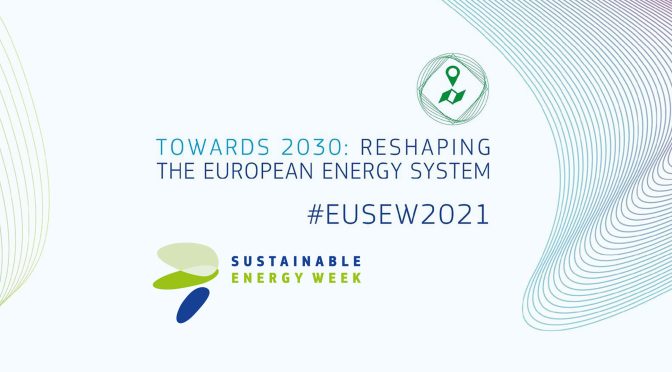Enel Green Power organized an event on October 27 as part of the EU’s Sustainable Energy Week. The speakers analyzed the need to address both economic and environmental issues, in order to create a just energy transition that leaves no one behind.
This month the world’s attention may be focused on COP26 in Glasgow, but last week saw another significant event in terms of the future of the environment: the 16th edition of EU Sustainable Energy Week (#EUSEW2021), an initiative of the European Commission. The theme this year was “Towards 2030: Reshaping the European Energy System” and, as part of this, Enel Green Power organized an event with a series of round tables on October 27 on the subject of “Empowering Sustainable Energy.” Not only did it provide a detailed analysis of the challenges of the energy transition, it also discussed some of the solutions that EGP has to offer. It featured both senior members of our organization and distinguished guests, including representatives of companies in the energy sector, such as Iberdrola, EDP and Wind Europe, and other institutions such as CSR Europe, the Bioeconomy and Environment Cluster of Western Macedonia, as well as Matteo di Castelnuovo, the Professor of Practice in Energy Economics at the SDA Bocconi School of management in Milan.
A keynote address was given by Aristotelis Chantavas, EGP’s Head of Europe Area. He argued that, in light of the recent gas-related energy crisis in Europe, a common European vision for climate neutrality by 2050 was more important than ever. While underlining the importance of the European Green Deal and the “Fit for 55” package (a commitment cut CO2 emissions by 55%, with respect to 1990 levels), he also called on the European Union to “proceed with a stable regulatory framework for all countries, which will facilitate the rapid and fair expansion of renewables.” He added that this framework must be “accompanied by a solid financial plan that will support green investments in all sectors, from electricity production to mobility and heating.”
Electrification
The first of the three round tables looked at the issue of electrification. Daniele Agostini, the Enel Group’s Head of Energy and Climate Policies, argued that it was the best way to satisfy energy needs in industry, building and transport. Not only is it essential for achieving carbon neutrality, and the numerous benefits which that entails, such as cleaner air and greater energy efficiency, but it also offers greater security, as it will help Europe overcome its dependence on gas from abroad. The panel also looked at some of the factors that have slowed down electrification, and the session ended with a simple but impassioned appeal from its moderator, Claudia Brandus, Enel’s EU Affairs Countries Coordinator: “We need to electrify now!”
A just transition
The second round table focused on the issue of a “just transition” that should be “socially and environmentally driven.” One of the main challenges associated with decarbonization is the need to balance environmental and socio-economic priorities. Chiara Palmisani, EGP’s Head of Sustainability Europe, emphasized that sustainability must also include social justice and outlined the need for more inclusive policies. We need to adopt an “ecosystem approach” to just sustainability transitions and we can learn from peacebuilding processes. That means meeting people where they are based, speaking their language, and building bridges between groups with different identities and needs. “Imbalances need to be tackled sooner rather than later because the energy transition also represents a one-off opportunity”, she said, adding that “The most delicate aspect concerns the regions whose economies are based mainly on fossil fuels. While the disappearance of some jobs is inevitable, national governments and supranational agencies can intervene with programs to reskill employees and provide professional training to offer new job opportunities, beginning with the redeployment to new activities linked to renewable sources. At the same time, the private sector must also play its part, by investing in creating local value.”
A Global Alliance
The third and final round table, on the Global Alliance for Sustainable Energy was an opportunity to take an in-depth look at this new organization’s objectives. The session opened with a video message from the Alliance’s spokesperson, EGP’s CEO Salvatore Bernabei who underlined that “this is a real global alliance because it is inclusive and it really represents all the energy sectors. We need to have a collective impact to develop sustainable energy.”
Inclusiveness, particularly in the case of the younger generation, who will literally inherit the Earth, featured prominently in this round table. The panel’s members included Fernanda Matsuoka, the Co-Founder and COO of Youth Climate Leaders. When asked what could be done to include young people in the decarbonization process, she produced an amusing answer: “How much time do we have?” She then went on to say that young people need to be empowered: this can be done through boot camps, by hiring and training them for new professions and building a youth program. The recent demonstration by Greta Thunberg at COP26 in Glasgow was a stark reminder that many youngsters are skeptical about the efforts of politicians to deal with climate change, and that is why, when it comes to sustainable energy, we have to get them – and indeed every generation – on board.
Relive the event by clicking here.


